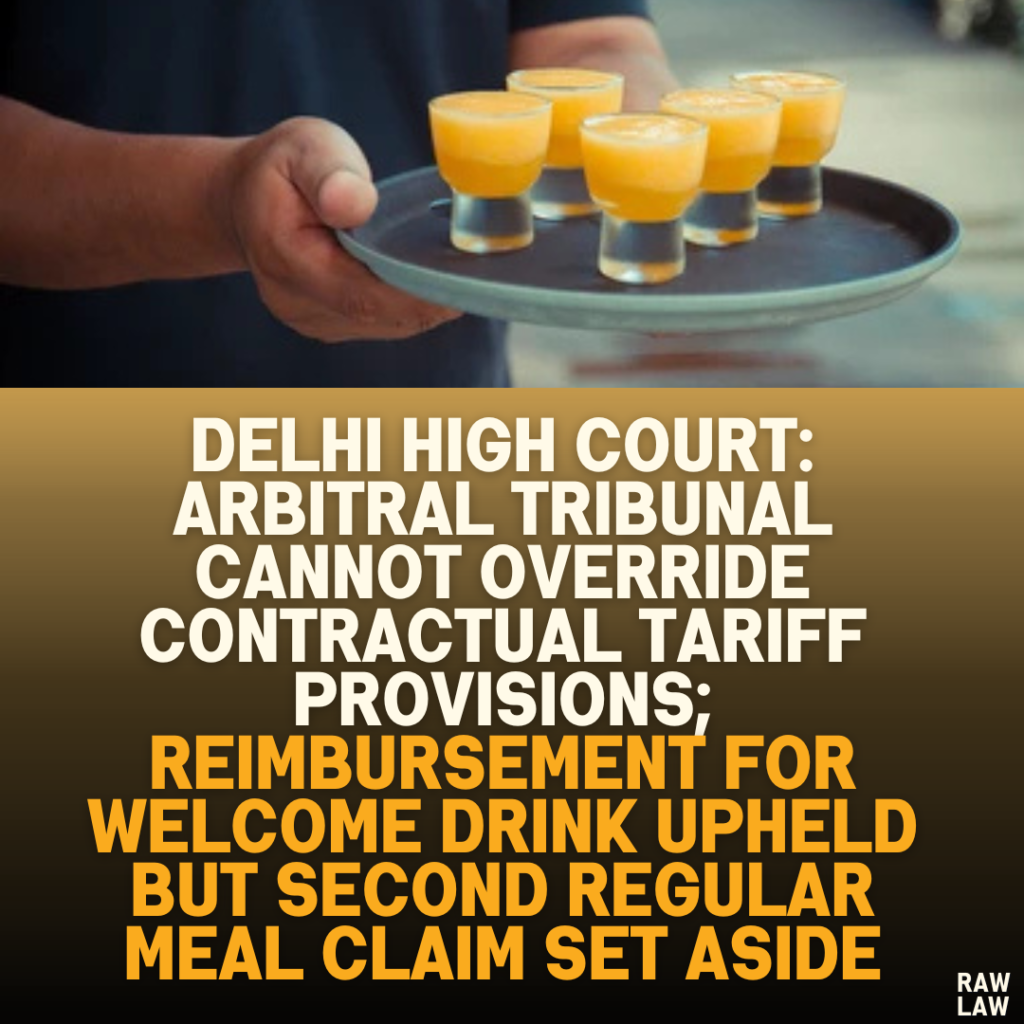Court’s Decision
The Delhi High Court adjudicated a series of cross-appeals filed under Section 37 of the Arbitration and Conciliation Act, 1996, against the Single Judge’s order partially setting aside an arbitral award. The Court upheld the award concerning Welcome Drink charges but overturned the award regarding the Second Regular Meal charges, holding that the arbitrator exceeded jurisdiction by contradicting contractual terms.
Facts
The dispute arose between Indian Railways Catering and Tourism Corporation Ltd. (IRCTC) and Brandavan Food Products concerning reimbursement for catering services under a contract governed by the 2010 Catering Policy. The petitioner, a caterer, was engaged under an agreement with IRCTC to provide meals on select trains. The key points of contention were:
- Introduction of a “Combo Meal” under Circular 09.10.2013, later replaced by a “Second Regular Meal” through Circular 23.10.2013.
- Inclusion of a Welcome Drink in passenger services through Circular 06.08.2014.
- The caterer claimed reimbursement for additional costs incurred in serving the Second Regular Meal and Welcome Drink, asserting these modifications were unilateral and increased expenses.
- The arbitral tribunal awarded compensation to the caterer, prompting IRCTC to challenge the award under Section 34 of the Arbitration Act.
- The Single Judge partially set aside the award, upholding claims related to Welcome Drinks but rejecting those concerning Second Regular Meal reimbursement.
Issues
- Whether the claimant was entitled to additional payments for serving the Second Regular Meal instead of a Combo Meal.
- Whether the claimant was entitled to reimbursement for serving the Welcome Drink.
- Whether the IRCTC had an absolute right under Clause 1.4 and Clause 8.1 of the Master License Agreement (MLA) to unilaterally alter meal tariffs.
- Whether the claimant’s acceptance of payments without protest constituted waiver or estoppel against subsequent claims.
- Whether the arbitral tribunal exceeded jurisdiction by awarding reimbursement despite contractual clauses permitting unilateral tariff modifications.
Petitioner’s Arguments (Brandavan Food Products)
- The claimant argued that the tariff modifications resulted in significant additional costs, which IRCTC was obligated to reimburse.
- The substitution of the Combo Meal with a Second Regular Meal effectively reduced profitability since no corresponding tariff increase was implemented.
- IRCTC’s imposition of a Welcome Drink without financial compensation was an unfair contractual burden.
- Clause 21.6 of the MLA prevented any delay in raising claims from constituting waiver.
- The arbitrator’s award was justified based on fairness and the fundamental principle that no party should bear costs imposed by the other without compensation.
Respondent’s Arguments (IRCTC)
- IRCTC contended that under Clause 1.4 and Clause 8.1 of the MLA, it retained absolute authority to modify catering tariffs and menu structures without requiring caterer consent.
- The claimant knowingly entered into the contract, accepting tariff policies, and subsequently raised bills reflecting the revised rates without immediate objection.
- The doctrine of estoppel applied since the claimant had accepted payments and issued invoices under the new pricing model without formal protest.
- The arbitrator’s reliance on equity to override contractual terms was impermissible under arbitration law.
- The award lacked evidentiary support, particularly regarding the quantification of Welcome Drink costs.
Analysis of the Law
- Section 34 of the Arbitration and Conciliation Act, 1996, allows setting aside of arbitral awards on grounds of patent illegality or conflict with public policy.
- Clause 1.4 and Clause 8.1 of the MLA granted IRCTC broad discretion in modifying catering tariffs.
- The Supreme Court has consistently ruled that arbitral tribunals must not create new contractual obligations outside express terms (referencing MMTC Ltd. v. Vedanta Ltd., 2019 and Associate Builders v. DDA, 2015).
- Courts have upheld that acceptance of contract modifications without protest constitutes waiver or estoppel (BSNL v. Nortel Networks, 2021).
Precedent Analysis
- MMTC Ltd. v. Vedanta Ltd. (2019): Reiterated that arbitral awards should not contravene explicit contractual terms.
- BSNL v. Nortel Networks (2021): Established that failure to protest contractual amendments bars subsequent claims.
- Associate Builders v. DDA (2015): Clarified that arbitral awards based on equity cannot override contractual provisions unless expressly permitted by the contract.
Court’s Reasoning
Second Regular Meal Claim:
- The Court held that the arbitrator had erred in awarding reimbursement since IRCTC’s authority to modify catering tariffs was contractually established.
- The claimant’s acceptance of payments under the revised structure without protest constituted estoppel.
- The arbitrator’s reliance on equity principles to override express contractual provisions rendered the award legally unsustainable.
Welcome Drink Claim:
- The Court upheld this portion of the award, reasoning that while IRCTC had tariff modification authority, it could not unilaterally impose additional costs without a corresponding reimbursement mechanism.
- The lack of clarity in the Circular regarding Welcome Drink pricing justified awarding compensation to the caterer.
Conclusion
- The Court dismissed IRCTC’s appeal concerning Welcome Drink charges, affirming the arbitrator’s decision to grant reimbursement.
- The award regarding Second Regular Meal charges was set aside as legally unsustainable, aligning with contract terms and prior judicial precedents.
- The judgment reinforced that while arbitral tribunals enjoy discretion, they must operate within the framework of contractual terms and established legal principles.
Implications
- This ruling underscores the limitations of arbitral tribunals in deviating from contractual stipulations based on perceived fairness.
- Establishes a precedent affirming IRCTC’s authority in tariff modifications while cautioning against arbitrary imposition of additional catering obligations.
- Clarifies the threshold for waiver and estoppel in commercial disputes, reinforcing the importance of timely objections to contractual changes.
- Provides guidance for future arbitration cases concerning government contracts, particularly in regulated sectors like railway catering.
This decision marks a significant interpretation of contract law in arbitration, reinforcing the necessity of adhering to explicit contractual provisions while recognizing exceptions where unilateral modifications impose undue financial burdens.



